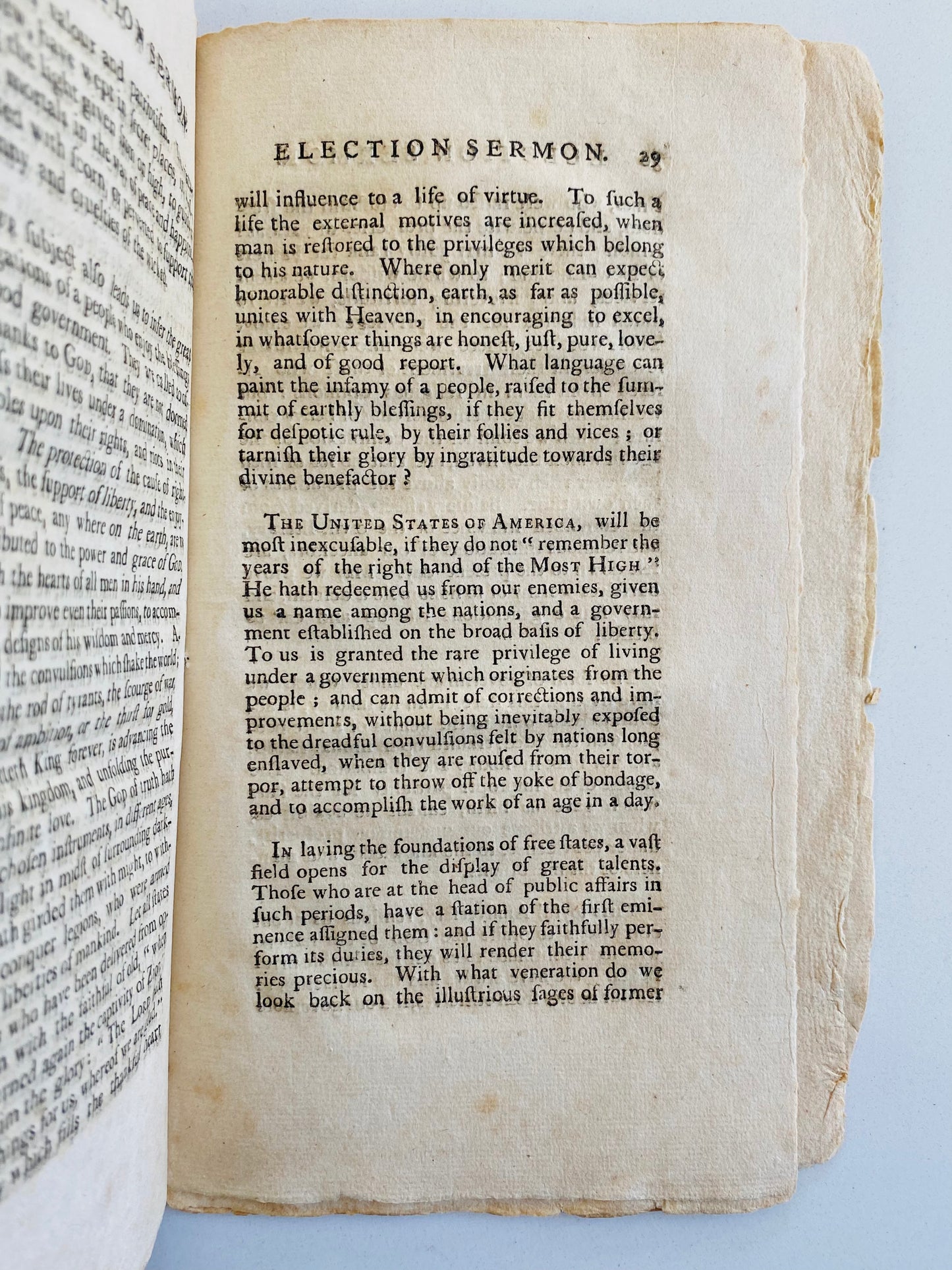Specs Fine Books
1793 CHARLES BACKUS. Democracy and Godliness or Tyranny and Godlessness the Only Two Options for a Government
1793 CHARLES BACKUS. Democracy and Godliness or Tyranny and Godlessness the Only Two Options for a Government
Couldn't load pickup availability
Fascinating sermon early in the life of the United States arguing that the only possible foundation of a democracy is godliness and the necessity of any government not founded on such principles ultimately to need to resort to tyranny for control of the populace.
Backus, Charles. A Sermon Preached before His Excellency Samuel Huntington, Esq. L.L.D. Governor, and the Honorable the General Assembly of the State of Connecticut, Convened at Hartford, on the Day of the Anniversary Election. May 9th, 1793. Hartford. Hudson and Goodwin. 1793. 38pp [complete].
Fascinating early post-American Revolutionary War sermon on Galatians 6.10, “As we have, therefore, opportunity, let us do good unto all men, especially unto them who are of the household of faith.”
“A religion, which is full of love, kindness, and compassion, must, when carried into general practice, produce the happiest effects on the principles and manners of society. All in proportion as they resemble the great pattern of benevolence, improve the numerous opportunities which occur, in the various relations of life, to prevent, or diminish the misery, and advance the happiness of their representative members.”
“To admit that children of the same family, have a natural right to enslave, or destroy one another, would be adopting the first born of absurdities. Nothing can be urged in support of it either from natural or revealed religion. Hence, God would not suffer the Israelites to enslave, or destroy the Amonites, until their iniquity was full.”
“Christian virtue . . . gives no countenance to superstition, or any species of tyranny. It is built on the immutable principles of moral rectitude. To these, civil institutions must be conformed, to support rational liberty, or promote general happiness.”
“The ruler who sets out to govern mankind without paying any regard to indelible moral impressions, steps upon new ground; and to maintain consistency, must suppose, either that a new creation is brought into existence, or that it is in his power to throw into oblivion the former creed. Let us for a moment, admit that he succeeds in banishing every moral and religious principle from the minds of his subjects; and that all the members of that remarkable commonwealth, do not hesitate to pronounce piety and virtue, the priesthood and the temple, the idle dreams of enthusiasm. We should be justly chargeable with taking too bold a flight, even for the regions of imagination, should we represent all the members of that utopian society, as thinking on a scale large enough to connect private with public wrongs. Passing the licentiousness of the contemplative few, how would the great body of that people be kept in any tolerable order, without the severities of despotic government, or without calling in the aid of something not less shocking to humanity, than a court of inquisition?”
“The United States of America, will be most inexcusable, if they do not remember the years of the right hand of the Most High. He hath redeemed us from our enemies, given us a name among the nations, and a government established on the broad basis of liberty. To us is grated the rare privilege of living under a government which originates from the people; and can admit of corrections and improvements, without being inevitably exposed to the dreadful convulsions felt by nations long enslaved, when they are roused from their torpor, attempt to throw off the yoke of bondage, and to accomplish the work of an age in a day.”
Etc.
Share
















